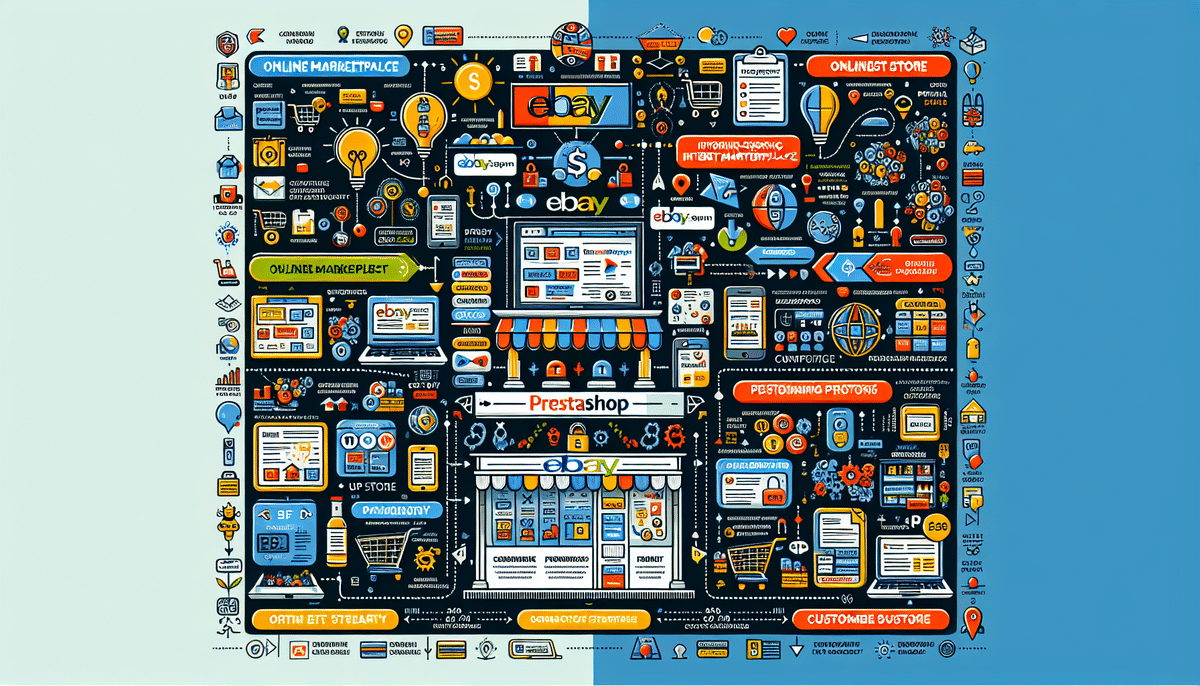PrestaShop vs eBay: Comprehensive eCommerce Platform Comparison
In today's digital age, establishing a strong online presence is crucial for businesses looking to expand their reach and increase sales. Two of the leading platforms in the eCommerce space are PrestaShop and eBay. This article provides an in-depth analysis of these platforms, comparing their features, pricing, customer support, integrations, and more to help you determine which is the best fit for your business needs.
Overview of PrestaShop and eBay
PrestaShop and eBay are prominent players in the eCommerce industry, each offering unique functionalities tailored to different business models. PrestaShop is an open-source eCommerce solution that enables users to create and manage their own online stores. Launched in 2007, it has grown into a widely adopted platform, supported by a robust community of developers and users.
Conversely, eBay is a well-established online marketplace founded in 1995, facilitating transactions between buyers and sellers across a vast range of product categories. As a hosted platform, eBay manages the technical aspects, providing sellers with a ready-made audience without the need for separate hosting or domain services.
Features Comparison
PrestaShop Features
- Product Management: Comprehensive tools for adding products, tracking inventory, and assigning attributes.
- Customer Management: Features for creating customer groups, tracking orders, and managing reviews.
- Marketing and Promotion: Tools such as discounts, loyalty programs, abandoned cart reminders, and affiliate programs.
- Customization: Extensive theme and module options allow for significant customization to match brand identity.
eBay Features
- Listing Options: Supports both auction-style and fixed-price listings to cater to different selling strategies.
- Automatic Bidding: Facilitates automated bidding processes to enhance buyer engagement.
- Immediate Payment Options: Streamlines the purchasing process with options like Buy It Now.
- Feedback System: Builds trust through a comprehensive rating system for buyers and sellers.
Pricing Comparison
Understanding the cost structures of PrestaShop and eBay is essential for making an informed decision:
PrestaShop Pricing
- Software Cost: PrestaShop is free to download and use.
- Additional Modules: Users may need to purchase modules or themes to enhance functionality, which can range from $30 to $200 each.
- Hosting and Domain: As a self-hosted platform, users must invest in hosting services, typically costing between $10 to $50 per month, and purchase a domain name.
eBay Pricing
- Listing Fees: eBay charges fees based on the number of listings and the final sale price, often around 10% of the sale.
- Store Subscriptions: eBay offers store subscriptions starting at approximately $27 per month for basic access.
- Additional Fees: Fees for optional features like promoted listings or international listings can apply.
According to eCommerce benchmarks, businesses on PrestaShop may incur higher initial setup costs but benefit from lower ongoing fees compared to eBay's transaction-based pricing model.
Ease of Use
PrestaShop Usability
PrestaShop offers a high degree of customization, which can be both an advantage and a challenge. Users with technical expertise can tailor their stores extensively, but those without such skills may find the setup process daunting. The platform provides comprehensive documentation and community support to assist users in building and managing their stores.
eBay Usability
eBay excels in ease of use, providing a straightforward setup process that allows sellers to start listing products quickly without the need for technical knowledge. The intuitive interface and extensive support resources make it accessible for individuals and businesses alike, facilitating a smooth selling experience.
Customer Support
Reliable customer support is crucial for resolving issues and optimizing platform usage:
PrestaShop Support
- Community Forums: Active forums where users can seek advice and share experiences.
- Knowledge Base: Extensive documentation covering various aspects of store management.
- Premium Support: Available for purchase, providing dedicated assistance for complex issues.
eBay Support
- Live Assistance: Offers phone and live chat support for immediate assistance.
- Help Center: Comprehensive resources and guides to help users navigate the platform.
- Seller Protection: Programs to safeguard sellers against fraudulent activities and disputes.
eBay's support infrastructure is often highlighted for its responsiveness and effectiveness, particularly beneficial for sellers who require prompt assistance.
Integrations and Flexibility
PrestaShop Integrations
As an open-source platform, PrestaShop supports a wide range of integrations with third-party services, including:
- Payment Gateways: Integration with services like PayPal, Stripe, and Authorize.Net.
- Shipping Providers: Connections with carriers such as UPS, FedEx, and DHL.
- Marketing Tools: Compatibility with email marketing platforms like MailChimp and Google Analytics for enhanced marketing efforts.
This flexibility allows businesses to tailor their eCommerce operations to their specific needs, enhancing functionality and performance.
eBay Integrations
eBay offers integrations primarily focused on enhancing the marketplace experience:
- Payment Solutions: Integration with PayPal and managed payments through eBay.
- Listing Tools: Tools that facilitate bulk listings and inventory management.
- Shipping Services: Partnerships with shipping carriers to streamline order fulfillment.
While eBay provides essential integrations for its marketplace, the scope is narrower compared to the extensive customization options available with PrestaShop.
Security Features
PrestaShop Security
With PrestaShop being a self-hosted platform, security measures are the responsibility of the user:
- SSL Certificates: Essential for encrypting data and securing transactions.
- Two-Factor Authentication: Enhances account security by requiring a second form of verification.
- Regular Updates: Users must ensure that their platform and all modules are up-to-date to protect against vulnerabilities.
Adhering to best security practices is imperative for PrestaShop users to safeguard their online stores.
eBay Security
As a hosted platform, eBay handles the majority of security concerns:
- Secure Payments: Robust payment systems to protect financial transactions.
- Fraud Detection: Advanced algorithms to identify and prevent fraudulent activities.
- Data Protection: Compliance with data protection regulations to ensure user information is secure.
eBay's comprehensive security framework provides a secure environment for both buyers and sellers, reducing the burden on individual users to manage security.
User Reviews and Experiences
User feedback is a valuable indicator of platform performance and satisfaction:
PrestaShop Reviews
Users appreciate PrestaShop's high level of customization and extensive feature set. However, some note that the platform can be complex to set up, especially for those without technical expertise. The availability of numerous modules and themes is frequently cited as a major advantage, allowing businesses to tailor their stores precisely to their needs.
eBay Reviews
eBay users generally commend the platform for its ease of use and large, built-in customer base, which can lead to quicker sales. The strong customer support and secure payment systems are also highlighted positively. On the downside, some users find eBay's fee structure to be complicated and the customization options limited compared to standalone platforms like PrestaShop.
Overall, reviews suggest that PrestaShop is ideal for businesses seeking a customizable and scalable solution, while eBay is better suited for those who prioritize ease of use and access to a vast audience.
Conclusion: Choosing the Right Platform for Your eCommerce Business
Deciding between PrestaShop and eBay hinges on your specific business requirements and priorities:
- PrestaShop is ideal for businesses that require complete control over their online store's design and functionality, value customization, and have the technical resources to manage a self-hosted platform.
- eBay is well-suited for sellers seeking a user-friendly platform with immediate access to a large customer base, minimal technical setup, and robust customer support.
Consider factors such as budget, technical expertise, desired level of customization, and the importance of having a dedicated storefront versus leveraging a marketplace's existing traffic. By evaluating these aspects, you can select the platform that best aligns with your business goals and operational capabilities.
For more detailed insights and data-driven comparisons, refer to reputable sources such as the Shopify Blog and BigCommerce Analysis.




















